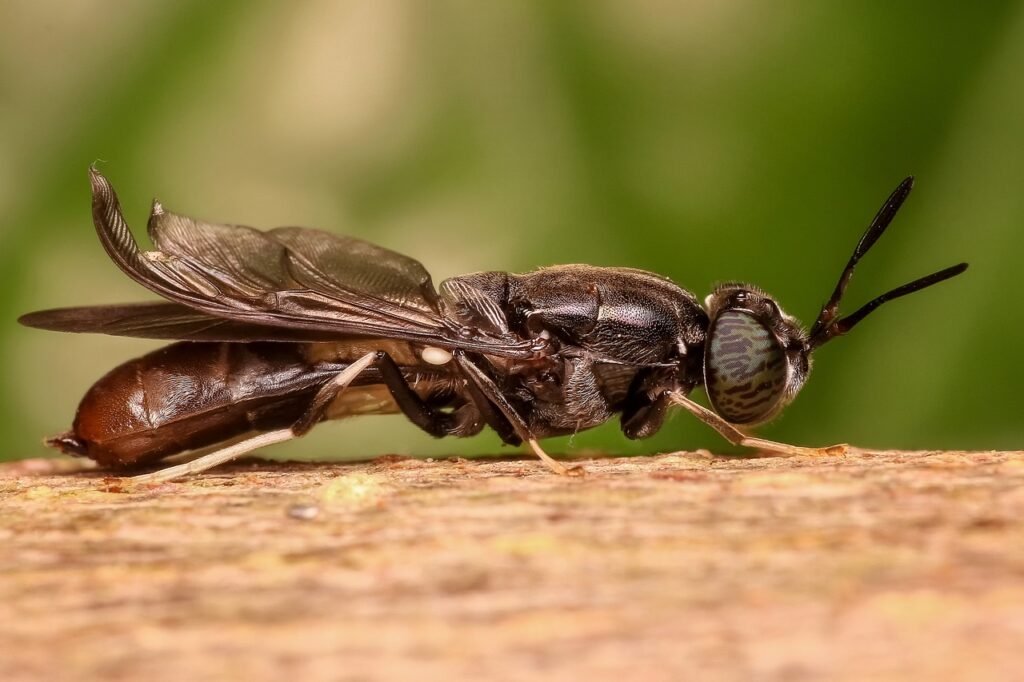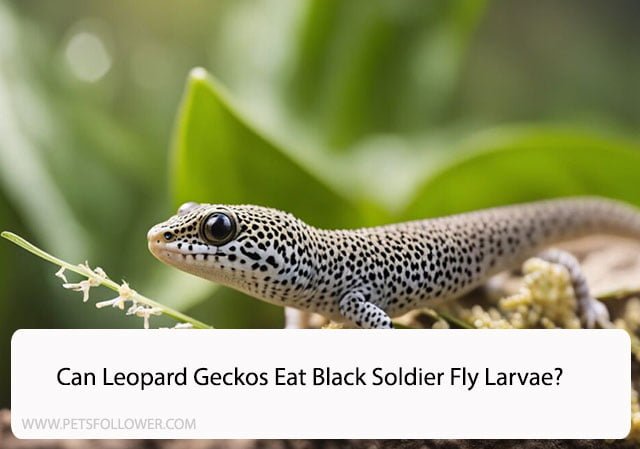Leopard geckos are popular pets for reptile enthusiasts due to their docile nature and unique appearance. As with any pet, it is important to provide them with a balanced diet that meets their nutritional needs. One question that often arises is whether leopard geckos can eat black soldier fly larvae, which have gained popularity as a nutritious and sustainable feeder insect.
The short answer is yes, leopard geckos can eat black soldier fly larvae. In fact, they are a great source of protein and calcium, which are essential for the health and growth of these reptiles. However, it is important to ensure that the black soldier fly larvae are properly gut-loaded and dusted with calcium powder before feeding them to your leopard gecko. In this article, we will explore the benefits and potential risks of feeding black soldier fly larvae to leopard geckos, as well as how to prepare them for optimal nutrition.
Nutritional Benefits of Black Soldier Fly Larvae for Leopard Geckos

When it comes to feeding leopard geckos, it’s important to provide them with a balanced diet that meets their nutritional needs. One food item that has gained popularity among leopard gecko owners is black soldier fly larvae. Here are some of the nutritional benefits of black soldier fly larvae for leopard geckos.
Protein Content
Black soldier fly larvae are an excellent source of protein, which is essential for the growth and development of leopard geckos. In fact, they have a higher protein content than many other commonly fed insects, such as crickets and mealworms. This makes them an ideal food item for young and growing leopard geckos.
Calcium-to-Phosphorus Ratio
Leopard geckos require a diet that is high in calcium to maintain healthy bones and prevent metabolic bone disease. Black soldier fly larvae have a favorable calcium-to-phosphorus ratio, which means they provide a good source of calcium without an excess of phosphorus. This is important because a diet that is high in phosphorus can interfere with calcium absorption and lead to calcium deficiency.
Fat Composition
Leopard geckos require a certain amount of fat in their diet to provide energy and support various bodily functions. Black soldier fly larvae have a healthy fat composition, with a higher proportion of unsaturated fats compared to saturated fats. This makes them a good choice for leopard geckos that require a moderate amount of fat in their diet.
Overall, black soldier fly larvae can be a nutritious and beneficial addition to a leopard gecko’s diet. However, it’s important to ensure that they are fed in moderation and as part of a varied diet that includes other insect prey items.
Feeding Guidelines for Leopard Geckos
When it comes to feeding leopard geckos, it is important to provide them with a balanced and nutritious diet. In this section, we will discuss the appropriate age for inclusion, frequency of feeding, and portion sizes.
Appropriate Age for Inclusion
Leopard geckos can start eating black soldier fly larvae (BSFL) at around 4-6 months of age. It is important to note that younger geckos may have a harder time digesting BSFL due to their tougher exoskeleton. Therefore, it is recommended to introduce BSFL gradually and monitor their digestion.
Frequency of Feeding
Leopard geckos should be fed 2-3 times a week. It is important to vary their diet and include a variety of insects, such as crickets, mealworms, and BSFL. The amount of BSFL given at each feeding should be adjusted depending on the size of the gecko and other insects being fed.
Portion Sizes
The portion size of BSFL should be based on the size of the gecko. As a general rule, the portion size should be no larger than the space between the gecko’s eyes. Overfeeding can lead to obesity and other health problems, so it is important to monitor their intake and adjust accordingly.
In conclusion, black soldier fly larvae can be a nutritious addition to a leopard gecko’s diet when introduced at the appropriate age and fed in moderation. By following these feeding guidelines, we can ensure our geckos are receiving a healthy and balanced diet.
Preparation of Black Soldier Fly Larvae

When it comes to feeding leopard geckos, black soldier fly larvae are a great source of protein. However, before feeding them to your gecko, it is important to properly prepare them. In this section, we will discuss the different ways to prepare black soldier fly larvae for your leopard gecko.
Live vs Dried
Black soldier fly larvae can be purchased either live or dried. Live larvae are typically more nutritious, as they are still actively consuming nutrients. However, they can be more difficult to store and may require more frequent feeding. Dried larvae, on the other hand, are easier to store and have a longer shelf life. They are also more convenient to feed, as they can be easily measured out and stored in a container.
Gut Loading
Gut loading is the process of feeding the larvae a nutritious diet prior to feeding them to your gecko. This ensures that the larvae are packed with nutrients that your gecko needs. Good options for gut loading include fruits, vegetables, and commercial gut loading diets. It is important to avoid feeding the larvae anything that could be harmful to your gecko, such as citrus fruits or foods high in fat.
Supplement Coating
Another way to ensure that your gecko is getting all the nutrients they need is to coat the larvae in a supplement powder. This can be done by placing the larvae in a bag with the supplement powder and shaking until they are coated. This is especially important if you are feeding dried larvae, as they may have lost some of their nutritional value during the drying process.
In conclusion, preparing black soldier fly larvae for your leopard gecko is an important step in ensuring that they are getting the nutrients they need. Whether you choose to feed live or dried larvae, gut loading and supplement coating are important steps to take.
Potential Risks and Considerations
When feeding leopard geckos black soldier fly larvae, there are a few potential risks and considerations to keep in mind. Here are some important factors to consider:
Choking Hazards
It’s important to make sure that the black soldier fly larvae are an appropriate size for your leopard gecko. If the larvae are too large, they can pose a choking hazard and potentially cause serious harm to your pet. Make sure to supervise your gecko while they are eating and remove any uneaten larvae to prevent choking.
Allergy Risks
Some leopard geckos may have allergies or sensitivities to certain foods, including black soldier fly larvae. If you notice any signs of an allergic reaction, such as swelling or difficulty breathing, discontinue feeding the larvae immediately and consult with a veterinarian.
Overfeeding Issues
While black soldier fly larvae can be a nutritious addition to your leopard gecko’s diet, it’s important to avoid overfeeding. Overfeeding can lead to obesity and other health issues. Make sure to provide a balanced diet that includes a variety of foods and avoid relying solely on black soldier fly larvae as a food source.
Overall, when fed in moderation and with proper consideration for potential risks, black soldier fly larvae can be a healthy and nutritious addition to your leopard gecko’s diet.
Incorporating Black Soldier Fly Larvae into a Balanced Diet

When it comes to feeding leopard geckos, it’s important to provide a balanced diet that meets their nutritional needs. One option to consider is incorporating black soldier fly larvae into their diet. Here are some tips on how to do so effectively.
Dietary Variety
Leopard geckos require a varied diet to ensure they receive all the necessary nutrients. Black soldier fly larvae can be a great addition to their diet, but shouldn’t be the sole source of food. We recommend incorporating other feeder insects such as crickets, mealworms, and dubia roaches to provide a variety of nutrients.
Supplemental Feeds
Adding black soldier fly larvae as a supplemental feed can provide additional protein, calcium, and other essential nutrients. We suggest dusting the larvae with calcium powder prior to feeding to ensure your gecko receives the necessary calcium intake.
Avoiding Nutritional Imbalances
While black soldier fly larvae are a great source of protein, it’s important to avoid overfeeding them. Too much protein can lead to nutritional imbalances and health issues. We recommend feeding black soldier fly larvae in moderation, as part of a varied diet.
In conclusion, incorporating black soldier fly larvae into a leopard gecko’s diet can provide a variety of essential nutrients. However, it’s important to ensure they are part of a balanced diet and not the sole source of food. By following these tips, you can effectively incorporate black soldier fly larvae into your gecko’s diet.
Frequently Asked Questions
How should black soldier fly larvae be introduced into a leopard gecko’s diet?
Black soldier fly larvae can be introduced into a leopard gecko’s diet gradually. Start by offering a few larvae as a treat and monitor your gecko’s response. If they show interest and eat them without issue, you can gradually increase the amount over time.
What nutritional benefits do black soldier fly larvae offer to leopard geckos?
Black soldier fly larvae are a great source of protein, calcium, and other essential nutrients for leopard geckos. They are also low in fat and can help promote healthy digestion.
Are there any risks associated with feeding leopard geckos black soldier fly larvae?
As with any new food item, there is always a risk of digestive upset or allergic reaction. However, black soldier fly larvae are generally considered safe for leopard geckos to eat. It’s important to ensure that the larvae are properly gut-loaded and free of any harmful bacteria or parasites.
What is the appropriate serving size of black soldier fly larvae for leopard geckos?
The appropriate serving size of black soldier fly larvae for leopard geckos will depend on their size and age. As a general rule, offer no more than 2-3 larvae per feeding for juvenile geckos and 4-5 larvae per feeding for adult geckos. It’s important to also vary their diet and not rely solely on black soldier fly larvae.
Can black soldier fly larvae be the primary food source for leopard geckos?
While black soldier fly larvae are a nutritious food source for leopard geckos, they should not be the primary food source. A varied diet that includes other insects such as crickets, mealworms, and waxworms is important for providing a balanced and complete diet.
How frequently should leopard geckos be fed black soldier fly larvae?
Leopard geckos can be fed black soldier fly larvae 1-2 times per week as part of a varied diet. It’s important to monitor their weight and adjust their feeding schedule accordingly. Overfeeding can lead to obesity and other health issues.





